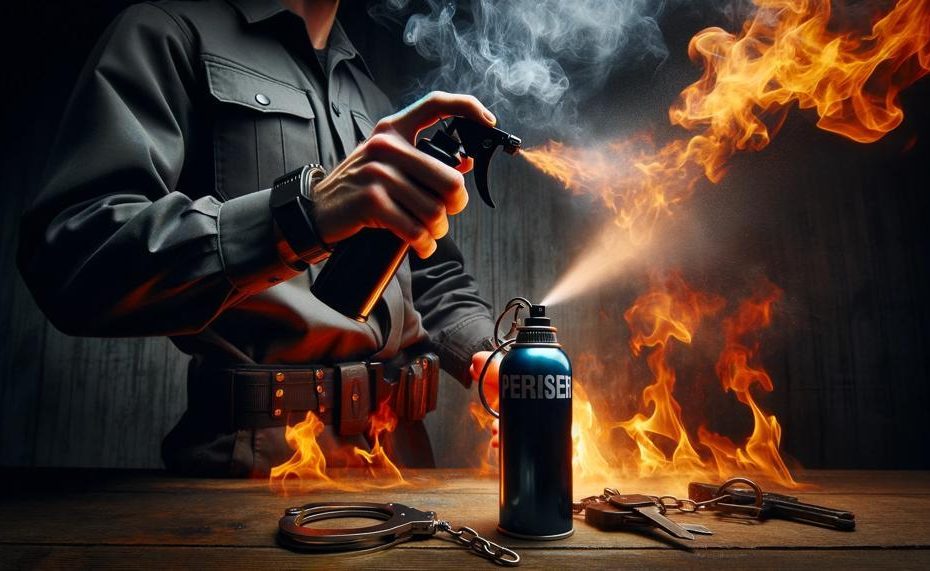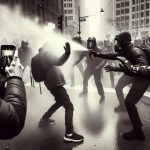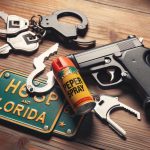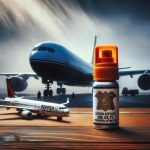Have you ever pondered what features common self-defense gadgets conceal? The possible flammability of pepper spray, a popular safety tool, is a secret that is seldom included in safety manuals. This discovery may change the way you think about this common aerosol.
We’ll examine a detail that might have a big impact on how pepper spray is used and stored as we delve into its chemistry and applications.
So, is pepper spray flammable?
Yes, pepper spray is slightly flammable because it contains flammable propellants like ethanol, isopropyl alcohol, methyl isobutyl ketone, and butane. However, pepper spray is not usually considered a fire hazard because it’s in a small container and doesn’t contain much ethanol. Typically, only a “small flame” will result, “unlikely to produce a severe burn injury”.
Pepper spray is usually made of a mixture of ethanol and capsaicin, which isn’t flammable. Most companies now use inert gases as propellants.
Some pepper sprays can ignite if someone has been sprayed before being tased. This is because the spark from the electronic control device (ECD) called the taser can ignite a flammable component of the pepper spray.
In hot temperatures, it is unwise to leave your pepper spray in your glove box. The heat can cause the can to burst or become ineffective.
Let’s ignite your curiosity and delve into a hot topic that’s been right under our noses – or in our purses and pockets – all along.
Contents
What Is Pepper Spray?
Pepper spray, a prevalent self-defence aerosol, incapacitates aggressors through an inflammatory effect. OC (Oleoresin Capsicum) is the principal active ingredient, derived from hot chilli peppers.
Mechanism of Action
Upon deployment, pepper spray unleashes an aerosol mist, designed to assail an aggressor’s eyes and respiratory system.
This mist causes temporary blindness, respiratory distress, and an acute burning sensation on the skin and mucous membranes.
Efficacy and Safety
As a self-defence implement, pepper spray is esteemed for its non-lethal yet potent incapacitating ability.
When aimed and dispensed accurately, it can thwart an attack, affording the user a chance to escape peril. It’s critical to handle pepper spray judiciously, reserving its use strictly for defensive scenarios.
Is Pepper Spray A Chemical Weapon?
Pepper spray, while used for personal defense and law enforcement, does indeed fall under the category of a chemical weapon. Let’s break it down:
Definition of a Chemical Weapon:
A chemical weapon is any toxic chemical or its precursor that can cause death, injury, temporary incapacitation or sensory irritation through its chemical action.
Munitions, devices and other equipment designed to deliver chemical weapons are also considered chemical weapons.
Application to Pepper Spray:
Pepper spray contains capsaicinoids, such as capsaicin, derived from chillies. These substances, when used in pepper spray, are concentrated and can incapacitate individuals by causing intense eye and skin irritation, difficulty breathing, and a burning sensation.
Pepper spray aligns with the broader definition of a chemical weapon because it’s a chemical compound that can cause sensory irritation and incapacitation. However, there’s a significant distinction in its intended use and the scale of its effects.
Pepper spray is designed for self-defense and to temporarily disable attackers without causing permanent harm, whereas military-grade chemical weapons are developed for mass incapacitation or lethality.
Comparison of Chemical Agents:
| Chemical Agent | Source | Typical Use | Weapon Classification |
|---|---|---|---|
| Capsaicin (Pepper Spray) | Chilli Peppers | Self-defense, riot control | Less-lethal chemical weapon |
| CS Gas | Man-made | Riot control | Chemical weapon |
| CN Gas | Man-made | Riot control | Chemical weapon |
Note that while pepper spray is considered a less-lethal weapon, its misuse or overexposure can lead to severe health complications or even fatalities.
It’s also worth mentioning that the use of chemical weapons, including pepper spray for riot control, has been subject to scrutiny and regulation under various international laws and agreements.
In self-defense contexts, pepper spray provides a non-lethal option to fend off attackers, which can be crucial in life-threatening situations.
Legality Of Pepper Spray
Pepper spray is indeed legal for self-defense purposes in all 50 states. Nonetheless, the devil is in the details, as each state has its set of regulations governing the ownership and use of pepper spray. Such rules can include restrictions on the age of the person carrying it, the size of the spray container, and the concentration of the active ingredient.
For instance, some places might frown upon a canister larger than a certain size or those with an overly potent concoction.
Others may require you to be a sprightly 18 years or older, or even slap on a condition that you’ve got to be squeaky-clean with no record of felony convictions.
Let’s lay out the land for a few key states:
| State | Legal to Carry | Notable Restrictions |
| New York | Yes | Must be over 18 and have no felony convictions, can only purchase from licensed firearms dealers or pharmacies. |
| California | Yes | Container must be less than 2.5 ounces. |
| Michigan | Yes | Pepper spray must be less than 10% concentration, and containers can’t exceed 35 grams of content. |
Before you decide to tuck a little bottle of this fiery concoction into your pocket or purse, make sure you’re clued up on your state’s specifics – ignorance isn’t going to butter any parsnips with local law enforcement if you’re caught out of step with the law.
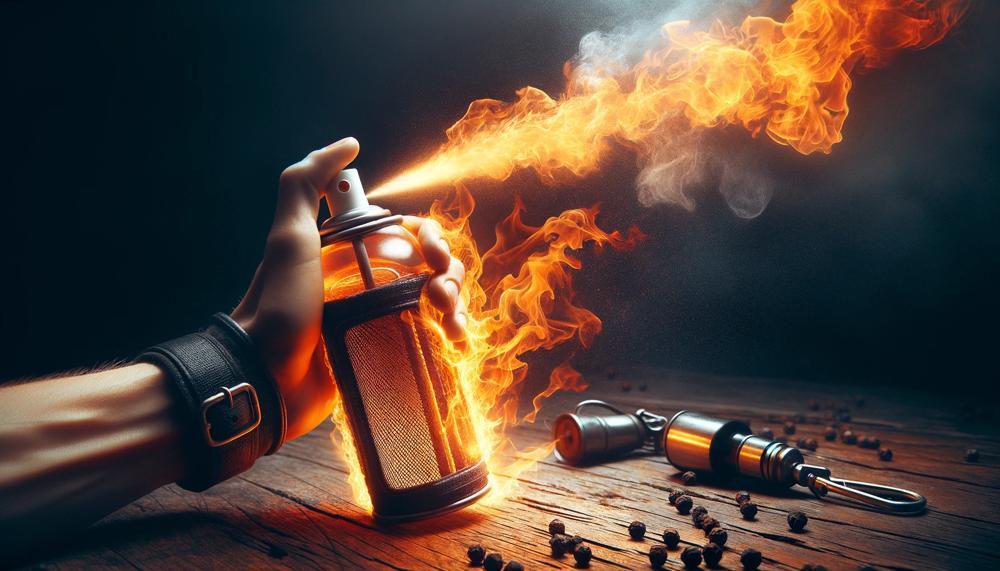
A quick squiz at your state’s legal guidelines or a chinwag with a knowledgeable authority would stand you in good stead.
Conclusion
Pepper spray has an unexpected feature: it may catch fire. People often conceal pepper spray in their handbags or attach it to keychains for added protection. Made from hot chili peppers, the material may catch fire when it comes into contact with extreme heat or an open flame. This property necessitates using extra attention while storing and use it.
It’s critical to comprehend pepper spray’s dual role as a weapon for self-defense and a possible fire danger. Users must be aware of the dangers posed by its chemical composition while also respecting its ability to render an attacker helpless with its powerful, eye-watering spray. This aerosol protects against injury but is not without risk; it is lawful in all of the United States, but with different limitations.
Pepper spray is a chemical weapon that is often classified as a less-lethal weapon; it is safe to use. It is a stealthy carrier of combustible qualities and a protector in times of need. Handling it carefully and navigating its legal terrain will guarantee that this little guardian angel stays a friend and not an unintentional light in the night.
Pepper spray is a standout choice for self-defense because of its affordability and potency. It is necessary to arouse in its users the awareness of its possible flammability.
